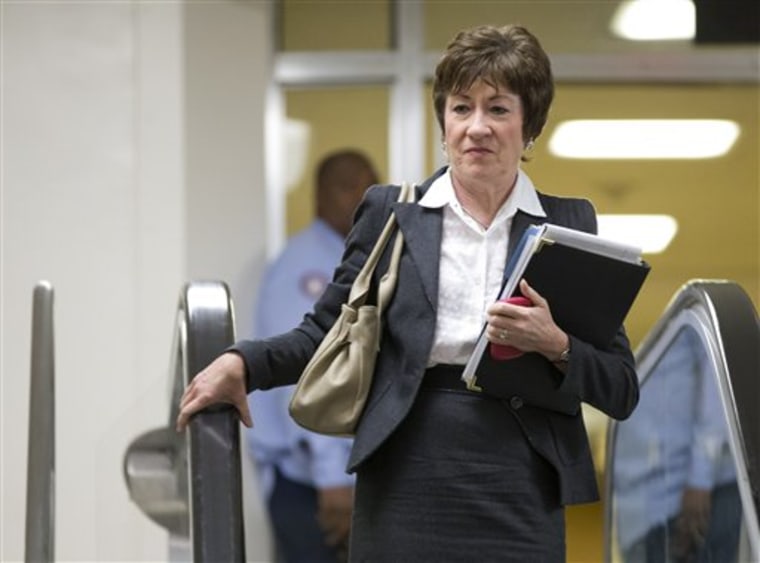There was an extraordinary scene in July when Sen. Susan Collins (R-Maine), making a routine trip home, walked into the terminal at Bangor International Airport and was greeted with spontaneous applause from her constituents. She'd just voted to derail the Republican Party's far-right health care gambit, and voters in Maine wanted to show their appreciation.
Collins, receiving the kind of outpouring of support most members of Congress can only dream of, described the scene as "amazing."
Five months later, after the Republican stuck with her party to pass regressive tax cuts for the wealthy, a group of voters gathered at Bangor International Airport to greet Collins with their backs turned toward her. The message wasn't subtle: for these Mainers, Collins had turned her back on them, so they were eager to return the favor. (She didn't actually see the display, remaining in D.C. that weekend.)
The result is a dynamic that's difficult to understand. During the brief debate, Collins urged her Republican colleagues not to lower the top rate, and GOP leaders, writing their bill behind closed doors, ignored her. She told these same Republicans that it'd be a mistake to target the Affordable Care Act's individual mandate in the legislation, and they ignored her once more.
Collins was able to negotiate a deal, however, securing promises from party leaders for votes on a pair of bipartisan health care measures in exchange for her support for the regressive tax plan. She even had this back and forth with the Portland Press Herald's Bill Nemitz:
"The deal is that (the Obamacare legislation) has to pass by the end of the year," Collins told me [two weeks ago].And if it didn't?"If this commitment is not kept to me, believe me, there will be consequences," she replied ominously. "There really will be. I mean, I can't not have the commitment happen."
The commitment didn't happen. Neither proposal received a vote and neither was included in the stopgap spending bill that prevented a government shutdown.
And while it's true that Congress may eventually consider the measures Collins fought for, it's also true that even if those policies are adopted, they almost certainly won't fully mitigate the damage to the health care system done by the GOP's tax package.
With this in mind, we're again left to wonder why in the world the Maine Republican voted for her party's plan. To that end, Collins has an op-ed in the Portland Press Herald today, making her case for the unpopular new tax law. She argued, for example, that she was able to push for some modest changes, which is true, but ultimately seems less significant than the unfulfilled deal Collins struck with GOP leaders.
The senator went on to insist the legislation "will help lower-income and middle-income families keep more of their hard-earned money," which paints a misleading picture. As the New York Times explained last week, the measure "rewards those who need it least -- the very wealthy -- while leaving those most in need with modest and temporary tax breaks."
Collins also argued that the package "doesn't take away anybody's insurance," which is at odds with an independent assessment from the Congressional Budget Office, which said Republican changes will push millions of Americans into the ranks of the uninsured.
And finally the Mainer insisted that "the reality is that the United States cannot continue to have the highest statutory corporate tax rate in the world at 35 percent." Actually, the reality is that while the status quo says the corporate rate is 35 percent on paper, but thanks to a series of loopholes and tax giveaways, plenty of corporations have paid an effective rate much lower than that -- and some ended up paying nothing at all. (A few years back, about a fourth of the companies included in the S&P 500 paid a rate of less than 20 percent, not 35 percent.)
If Collins is going to restore her standing, she'll probably have to do better than this.
